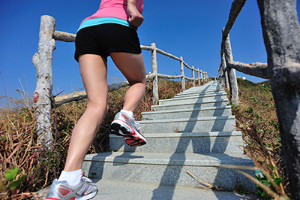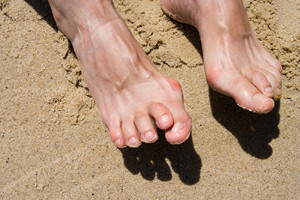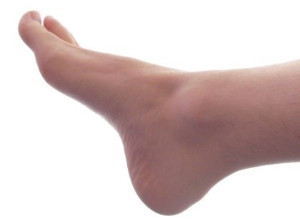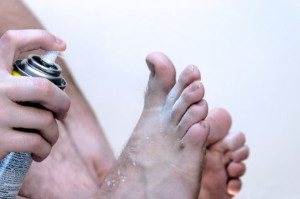
Drexel Hill (484) 521-0233
West Chester (610) 436-5883

Drexel Hill (484) 521-0233
West Chester (610) 436-5883
 Those who enjoy hiking as a regular activity should be sure to employ foot care while on the trail to avoid potential pain and injury. The first step to maintaining proper foot care while hiking is to be aware of one’s surroundings. Many hiking-related foot injuries and conditions often occur as a result of not being aware while on the trail: rolled ankles, broken toes, and blisters. When hiking, be sure to wear shoes that are breathable and that either dry quickly or are waterproof. When trying on hiking boots or shoes, finding a great fit is important. With modern innovations in footwear, hiking boots are becoming lighter and more comfortable.
Those who enjoy hiking as a regular activity should be sure to employ foot care while on the trail to avoid potential pain and injury. The first step to maintaining proper foot care while hiking is to be aware of one’s surroundings. Many hiking-related foot injuries and conditions often occur as a result of not being aware while on the trail: rolled ankles, broken toes, and blisters. When hiking, be sure to wear shoes that are breathable and that either dry quickly or are waterproof. When trying on hiking boots or shoes, finding a great fit is important. With modern innovations in footwear, hiking boots are becoming lighter and more comfortable.
Everyday foot care is very important to prevent infection and other foot ailments. If you need your feet checked, contact the podiatrists from Dr. Siegerman & Associates. Our doctors can provide the care you need to keep you pain-free and on your feet.
Everyday Foot Care
Often, people take care of their bodies, face and hair more so than they do for their feet. But the feet are a very important aspect of our bodies, and one that we should pay more attention to. Without our feet, we would not be able to perform most daily tasks.
It is best to check your feet regularly to make sure there are no new bruises or cuts that you may not have noticed before. For dry feet, moisturizer can easily be a remedy and can be applied as often as necessary to the affected areas. Wearing shoes that fit well can also help you maintain good foot health, as well as making it easier to walk and do daily activities without the stress or pain of ill-fitting shoes, high heels, or even flip flops. Wearing clean socks with closed shoes is important to ensure that sweat and bacteria do not accumulate within the shoe. Clean socks help to prevent Athlete’s foot, fungi problems, bad odors, and can absorb sweat.
If you have any questions please feel free to contact one of our offices located in Drexel Hill and West Chester, PA . We offer the newest diagnostic and treatment technologies for all your foot and ankle needs.
 If you have hammertoes, it may be due to a number of factors including improperly-fitting shoes or muscle and nerve diseases that can affect your feet. Hammertoes are described as bent and curled toes, seeming to resemble the claw of a hammer. The condition is permanent and may require treatment if pain progresses. Typical treatment includes wearing the proper footwear and physical therapy. A final option is surgery for severe cases, but consulting with your podiatrist first about your condition is recommended before deciding on the surgical option.
If you have hammertoes, it may be due to a number of factors including improperly-fitting shoes or muscle and nerve diseases that can affect your feet. Hammertoes are described as bent and curled toes, seeming to resemble the claw of a hammer. The condition is permanent and may require treatment if pain progresses. Typical treatment includes wearing the proper footwear and physical therapy. A final option is surgery for severe cases, but consulting with your podiatrist first about your condition is recommended before deciding on the surgical option.
Hammertoe
Hammertoes can be a painful condition to live with. For more information, contact the podiatrists from Dr. Siegerman & Associates. Our doctors will answer any of your foot- and ankle-related questions.
Hammertoe is a foot deformity that affects the joints of the second, third, fourth, or fifth toes of your feet. It is a painful foot condition in which these toes curl and arch up, which can often lead to pain when wearing footwear.
Symptoms
Causes
Genetics – People who are genetically predisposed to hammertoe are often more susceptible
Arthritis – Because arthritis affects the joints in your toes, further deformities stemming from arthritis can occur
Trauma – Direct trauma to the toes could potentially lead to hammertoe
Ill-fitting shoes – Undue pressure on the front of the toes from ill-fitting shoes can potentially lead to the development of hammertoe
Treatment
Orthotics – Custom made inserts can be used to help relieve pressure placed on the toes and therefore relieve some of the pain associated with it
Medications – Oral medications such as anti-inflammatories or NSAIDs could be used to treat the pain and inflammation hammertoes causes. Injections of corticosteroids are also sometimes used
Surgery – In more severe cases where the hammertoes have become more rigid, foot surgery is a potential option
If you have any questions please contact one of our offices located in Drexel Hill and West Chester, PA . We offer the newest diagnostic and treatment technologies for all your foot and ankle needs.
 There are over 100 different varieties of HPV, or human papilloma virus. Nearly 12% of the global population have had warts at one time, and plantar warts are but one of these types. They all share one basic characteristic, they have the ability to infect skin cells. Many people, when they hear the term HPV, think that it refers to genital warts. But this is not the case, and HPV can manifest itself in many different forms. Plantar warts occur on the feet, typically on the palms or the soles. They can be flat or raised, and usually occur in dry, cracked areas of the foot. Treatments vary in scope and effectiveness. If you think you may have a plantar wart, talk to your podiatrist and go through the treatment options available.
There are over 100 different varieties of HPV, or human papilloma virus. Nearly 12% of the global population have had warts at one time, and plantar warts are but one of these types. They all share one basic characteristic, they have the ability to infect skin cells. Many people, when they hear the term HPV, think that it refers to genital warts. But this is not the case, and HPV can manifest itself in many different forms. Plantar warts occur on the feet, typically on the palms or the soles. They can be flat or raised, and usually occur in dry, cracked areas of the foot. Treatments vary in scope and effectiveness. If you think you may have a plantar wart, talk to your podiatrist and go through the treatment options available.
Plantar warts can be very uncomfortable. If you need your feet checked, contact the podiatrists from Dr. Siegerman & Associates. Our doctors will assist you with all of your foot and ankle needs.
About Plantar Warts
Plantar warts are the result of HPV, or human papillomavirus, getting into open wounds on the feet. They are mostly found on the heels or balls of the feet.
While plantar warts are generally harmless, those experiencing excessive pain or those suffering from diabetes or a compromised immune system require immediate medical care. Plantar warts are easily diagnosed, usually through scraping off a bit of rough skin or by getting a biopsy.
Symptoms
Treatment
To help prevent developing plantar warts, avoid walking barefoot over abrasive surfaces that can cause cuts or wounds for HPV to get into. Avoiding direct contact with other warts, as well as not picking or rubbing existing warts, can help prevent the further spread of plantar warts. However, if you think you have developed plantar warts, speak to your podiatrist. He or she can diagnose the warts on your feet and recommend the appropriate treatment options.
If you have any questions please feel free to contact one of our offices located in Drexel Hill and West Chester, PA . We offer the newest diagnostic and treatment technologies for all your foot and ankle needs.
 Anyone that has ever had Athlete’s foot knows how much of a nuisance it is. It itches and itches, and no amount of scratching will make it relent. The foot gets red, and pain can quickly ensue. Athlete’s foot is a fungus, and like most fungi, thrives in warm, moist environments. The gym is a perfect place for this fungus, so it is important to remember to wear sandals when showering after your workout. Keep your feet dry, make sure to clean them well, and change your socks daily. If your feet are prone to sweating you may have an increased risk of Athlete’s foot, so double your efforts in this regard. If you do contract the disease, over the counter treatment options are available, and are quite effective.
Anyone that has ever had Athlete’s foot knows how much of a nuisance it is. It itches and itches, and no amount of scratching will make it relent. The foot gets red, and pain can quickly ensue. Athlete’s foot is a fungus, and like most fungi, thrives in warm, moist environments. The gym is a perfect place for this fungus, so it is important to remember to wear sandals when showering after your workout. Keep your feet dry, make sure to clean them well, and change your socks daily. If your feet are prone to sweating you may have an increased risk of Athlete’s foot, so double your efforts in this regard. If you do contract the disease, over the counter treatment options are available, and are quite effective.
Athlete’s foot is an inconvenient condition that can be easily reduced with the proper treatment. If you have any concerns about your feet and ankles, contact the podiatrists from Dr. Siegerman & Associates. Our doctors will treat your foot and ankle needs.
Athlete’s Foot: The Sole Story
Athlete's foot, also known as tinea pedis, can be an extremely contagious foot infection. It is commonly contracted in public changing areas and bathrooms, dormitory style living quarters, around locker rooms and public swimming pools, or anywhere your feet often come into contact with other people.
Solutions to Combat Athlete’s Foot
Athlete’s foot can cause many irritating symptoms such as dry and flaking skin, itching, and redness. Some more severe symptoms can include bleeding and cracked skin, intense itching and burning, and even pain when walking. In the worst cases, Athlete’s foot can cause blistering as well. Speak to your podiatrist for a better understanding of the different causes of Athlete’s foot, as well as help in determining which treatment options are best for you.
If you have any questions please feel free to contact one of our offices located in Drexel Hill and West Chester, PA . We offer the newest diagnostic and treatment technologies for all your foot and ankle needs.
Request a free copy of
Laser Away Foot Pain!
today.
